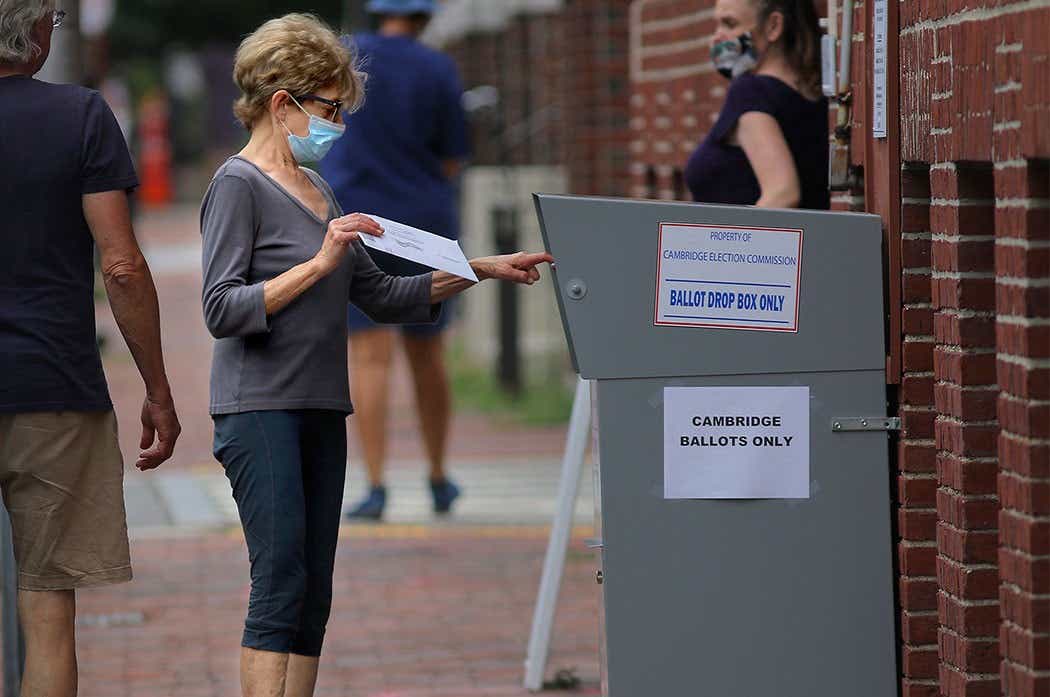As the coronavirus pandemic rages, officials are expecting a surge in mail-in ballots in November’s elections. But voting by mail has become an increasingly partisan affair, with President Trump repeatedly attacking the voting method as corrupt.
The president has made unsubstantiated claims that voting by mail leads to greater voter fraud and claimed that Democrats’ plans for nationally expanding early voting and voting by mail would give them an unfair advantage. “You’d never have a Republican elected in this country again,” the president has said in reference to the voting method.
Republican election lawyer Tom Spencer pushed back against these claims, saying vote-by-mail gives no clear partisan advantage in high turnout elections and acknowledged that the president “has a tendency to exaggerate a lot” when it comes to potential mail-in voting fraud.
“I think the answer is no, I don’t think that it gives an advantage to one party or the other,” Spencer told Wake-Up Call, noting that mail-in voting is especially popular among senior voters in Florida, where the practice has been widespread for years. This same demographic also swung heavily towards the president in the 2016 election.
Several studies have also arrived at the same conclusion: Voting by mail doesn’t provide a clear partisan advantage. In fact, as states have expanded their use of mailed ballots over the last decade — including the five states that conduct all-mail elections — both parties have enjoyed a small but equal increase in voter turnout.
But Spencer, who is also vice president of the nonprofit Lawyers Democracy Fund, did share some of the president’s concerns. He pointed to the practice of ballot “harvesting,” by which political groups from both sides of the aisle collect mail ballots directly from voters and send them in bulk to be counted.
The practice is only legal in California, where it found particular success in the 2018 midterms. Republicans, including Spencer, attributed the party’s losses to those efforts.
“Now the question where it may give an advantage is vote harvesting,” he said, pointing to California’s 2018 midterms. “They were able to harvest these votes because they just put out a massive movement of people to go to these nursing homes and other places and grab those ballots and take them into the voting officials.”
Spencer was also wary about many states making last-minute adjustments to make mail voting more accessible due to concerns about the coronavirus. He warned absentee and universal mail voting could wind up being “real nightmare” even in states like Oregon and Colorado that have long conducted voting primarily by mail.
“These vote by mail ballots, which are live ballots — universal — where people haven’t requested them, I think that’s going to be a real, real nightmare — not only because of the delivery of the ballots, but also getting them correctly signed and in on time,” he said.
Instead of expanding voting options, he believes that officials should maximize turnout by ensuring that voters know what their options are in their states on Election Day. “Election officials need to clearly and expressly and repeatedly notify the voters of their options to vote and what the risks are,” Spencer said.
But Spencer is optimistic about election security going into November’s elections, saying foreign threats are “virtually nil” compared to 2016, when Russian agents targeted the U.S. presidential elections through social media disinformation and hacking efforts.
Christopher Krebs, the top cybersecurity expert at the Department of Homeland Security, has echoed a similar sentiment, saying differences between 2020 and 2016 are like “night and day.” Krebs said ensuring election security has increasingly gained bipartisan support, with all 50 states working together on the issue.
But that doesn’t mean that U.S. elections aren’t necessarily at risk. Earlier this month, top U.S. counterintelligence officials reported that Russia is using a “range of measures” to “primarily denigrate” Democratic presidential nominee Joe Biden, while China prefers President Trump not win reelection.
Though the U.S. is being more proactive when it comes to election security, Spencer did implore voters to be proactive and vote early. That way, if there are any issues with their mail-in ballot, they can address it in time. Spencer, who is based in Florida, said invalid ballots happen a lot more than one might expect. From coffee stains to signatures not matching up, he has seen it all.
“The least citizens can do is be involved in that process and stay on top of it and get that ballot in,” he said.
This originally appeared on Medium.









